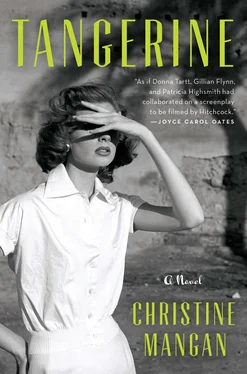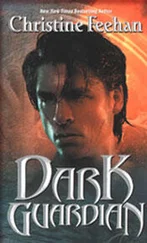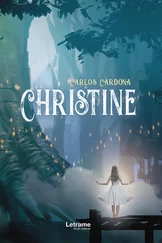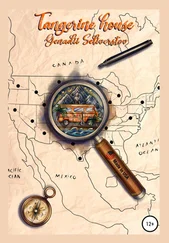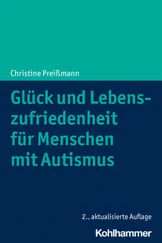But when I looked up at her, what I saw made me stop and blink.
It was Lucy, I had been certain. But no, I could see now that I had been wrong. That it was a woman, yes, but not Lucy—not anyone who even looked like her, not really. This woman was older, taller—she was fair where Lucy was dark—and she was watching me with concern, her hand pressed up against her mouth, her eyes wide with an expression that I could not manage to read.
I shook my head.
“I’m sorry,” I murmured. “Je suis désolée.” I continued, moving my head oddly, I thought, though I could not stop the gesture, a funny tilt that looked as though I were bowing to her. She started to speak, to say something, but I walked—no, sprinted —away, imagining that she, whoever she was, remained there, watching me with derision. I could almost hear it, her laughter pressing up against my back as I hurried from one street to the next, not paying attention to where I was going, needing to lose myself in the crowd, to put as much distance between myself and that grinning face as possible.
BY THE TIME I RETURNED HOME, Lucy was gone.
At first I could not believe it, assumed that she was only out, somewhere in the city. But then, stepping into her room—slowly, at first, as though I expected her to emerge at any moment—I could see that it was true. Her suitcase, her clothes, her toiletries, everything was gone. As though she had never really even been there.
I felt the realization, dully, felt the knowledge of what her absence truly meant begin to sink in, slowly, trickling, bit by bit.
Youssef would not speak up. Aunt Maude did not believe me. Worse still, she thought I was the one responsible. I thought of the officer from earlier—his questioning, his disappointment and simultaneous glee as he realized just how many of the questions he put before me I was unable to answer. I knew then that it would not be long before they came.
I leaned up against the wall and felt the bracelet in my pocket, solid and heavy.
At the reminder of it now I felt the rage well up inside me. It erupted in that moment, so that its release felt almost violent, such that I could actually feel it leaking from my pores.
I tore the plates from the wall first, the force of the movement wrenching my shoulder. I ignored the pain, ignored the trembling of my hands, desperate to have them gone—wanting, no, needing, to destroy this place that had once promised safety, a new chance, a new start. It had been lies. And in that moment, I wanted nothing more than to destroy it.
When my own strength failed me, I ran to the kitchen, my hands encircling the sharpest knife that I could find. This I plunged through the cushions on the sofa, through the leather poufs on the ground, pulling down on the knife’s handle with such force that the fabric had no choice but to yield at last, pulling apart at my insistence. My hands were shaking, my breath short and fast. I could feel my heart thudding loudly against my chest as I wiped away the sweat that had collected on my forehead.
I had an image then of what I must look like—face wild, teeth and claws bared.
Dropping the knife, I collapsed onto the ground amid the tattered room, now torn into jagged strips, the remains scattered around me like some macabre version of snowfall. And I waited, for the feeling of comfort, the feeling of triumph to wash over me. I looked down at the mess that I had made—but there was nothing. Only the feeling of emptiness at the thought that she was gone. That I might never know for certain—what she had done then, what she had done now. That all I would ever have were my own suspicions, my own convictions, which suddenly did not seem like enough at all.
And there was something else too.
It was absurd, grotesque even, but there was something like a physical ache, just there, behind my rib cage. I remembered the moment at the police station, earlier, when I had turned to look for her. Almost as if there were some missing part of me that only Lucy’s presence would ever truly complete. For even though I blanched at the idea, without her, I knew from experience, my resolve diminished, my voice disappeared. Whatever symbiosis existed between us was real, tangible, and now, without her presence I could feel the absence of it, as if she were an extension of my own person. She was, I realized, that awful, wretched part of me that should be locked away and boarded up forever—like Jane’s madwoman in the attic. She was the unfiltered version, the rawness that no one should ever see. She was every wicked thought, every forbidden desire turned real and visceral. I held up my hand and saw that the dye from the leather had stained my skin. I laughed, whispering the words to myself, See, you will never be rid of her . I looked down once again, willing myself to feel something, anything.
But there was nothing. Nothing at all.
I HEARD MY NAME BEING CALLED, muffled, from the other side.
It was the police, I knew. They had returned at last.
I looked at the walls of my apartment, desperate to be swallowed up by them, to be consumed, once and for all, by the shadows lurking in the corners.
I should have known that I would never be able to outrun them.
That I would never be able to outrun her .
I moved from my place on the floor. Strips of leather, of fabric, now stuck to my arms. There was a small piece affixed to my cheek. Pulling them away, gazing down at the strips of canvas, I was gripped with the conviction that none of it, what happened with Tom, with John, with anything in between, mattered. Not really. This had always been about her, about me, about the two of us. And it was always destined to end this way.
There was an ache in my head, and I pushed my fingers into my temple.
The knocking grew more insistent.
I thought about the last time I had heard someone knock on the door like that, the morning that John had disappeared. No, not the morning of his disappearance, but the first time I had learned of it, from that strange man with the scar. I wondered then, and not for the first time, who he had been and why he had been so reluctant to contact the police. If he truly had been the person following me that day in the streets. If what the police had said, about John leaving with Sabine, had been true. It made me realize that I had never really known John, only the hazy mirage he had presented to me that summer we first met, a shimmering beacon of hope that I had clung to in my darkest moment. I turned toward the door, toward the sound of someone fumbling with the knob. It was locked. They would not get in so easily.
I moved quickly, toward the bedroom.
They had come for me at last, my invisible shadows, which Lucy had made real. But this time, I knew, they would not go away. After all, the police believed that I was responsible for John’s death—if not the actual physical act, then at least in the collusion of it. A Lady Macbeth whispering that could not go unpunished.
I thought about John’s body, wondering whether they would bury it here or whether they would return it to England. I thought of his eyes, empty—or at least I imagined they were empty, for they had been closed when I had seen them last. It seemed strange, the idea of returning him to his birthplace. He had loved Tangier, and she had loved him, for a time. It didn’t seem right for them to be parted. No, it made sense for him to remain with her, forever. I hoped they would realize that.
I grasped the knife that I had picked up from the floor.
In many ways, this too seemed to make a certain sort of sense. As if all the years in between now and my parents’ death I had only been waiting, for this. For the end that I was meant for that night, that I perhaps would have succumbed to, if not for some strange miracle. Or perhaps it had not been a miracle after all. Perhaps it had only been a mistake. Perhaps I had not been meant to survive, and the shadows were simply warnings, or time, watching over me, waiting, for my impending death.
Читать дальше
